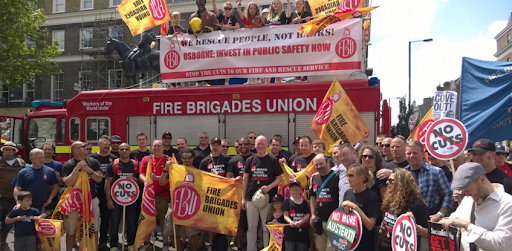Major unions across the UK are taking a stand as the government fails to mitigate inflation rates. The Fire Brigades Union (FBU) declares the nature of the inability to match the cost of living. As inflation heads towards an 11% increase, the FBU implores for a pay rise that satisfies it, having rejected the offer of a 2% annual increase, remarking that it is still essentially a cut in wages for firefighters in all roles. With the refusal to negotiate this request, the union is now preparing for a ballot for a strike over pay, involving all firefighters and firefighter control staff in the UK.
Words by Clarissa Davies
Not only is the government’s underfunding affecting pay rates, it has had a huge effect on resources. East Sussex FBU announced on Twitter that government cuts to fire and rescue services have caused a drastic decrease in fire engine availability across East Sussex accompanied with a map illustrating areas of unavailability including Seaford and Pevensey. The union also expressed its anger towards the lack of resources and preparation for the wildfire incidents that occurred in July and explained how the IRMP strategy must consider the problem of climate change. They elucidate that there have been 11,500 firefighters cut since 2010 and understaffing was so bad that during the wildfires they were forced to rely on off-duty firefighters.
The union also discusses the fight against regional controls, defending their pensions, improved health and safety legislation, and union and employment rights. The union attempts to target politicians to get them on board and plan on ensuring they have a greater impact on policy making in the future.
Southern Railway have undergone a series of strikes over the past year in an attempt to address disputes over jobs, pay, pensions and working conditions. The Tory party’s decision to cut £4 billion of funding from transport systems has resulted in thousands of job cuts and below-inflation pay rises. Network Rail offered a 4% pay increase for the rest of the year and another potential 4% increase the following year on the grounds that staff agree to changes in their contracts, which General Secretary Mick Lynch and other Union leaders rejected, calling for at least a 7% increase which still resides below the current rate of inflation. Network Rail responded with threats of redundancies and 50% cuts to maintenance work. The Conservative government also wants to make changes to the Railway Pension Scheme by reducing benefits and making them work for longer. The Railway Service has also been affected by the pandemic as more people prefer to work from home now, resulting in less commuters and therefore less revenue. RMT implores action to be taken to find a ‘sustainable footing’.
In references to these areas, Southern Railway, in part with a larger group of national rail staff, have turned to striking. Former Prime Minister Boris Johnson labelled these strikes as ‘unnecessary’, while the Department of Transport claims that striking should be the last resort and declares that they are jeopardising the future jobs in the rail service. The strikes were intended to continue into September but have now been postponed due to Her Majesty the Queen’s death.
It is presently unclear whether these strikes will have an impact and whether the unions will be successful in their objectives in their opposition to the Tory party.

